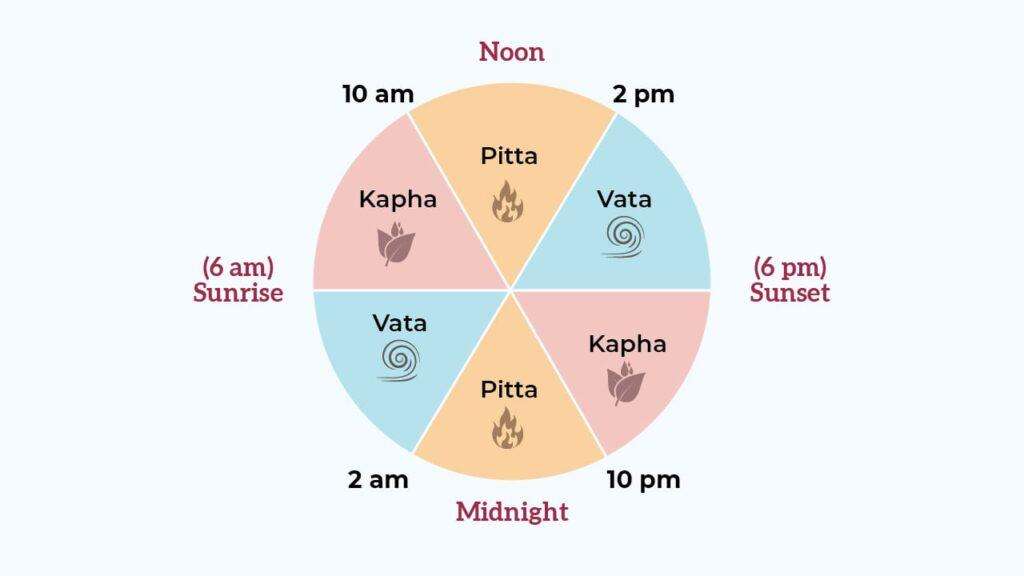The Ayurvedic Daily Routine Is Your Antidote To Life Stressors

People often find it difficult to follow a definite daily routine and end up spending their day haphazardly. Sleeping late due to work overload, binge-watching web series for long hours, scrolling mindlessly through social media feeds, scourging through the kitchen to find a snack at an odd hour or whipping up a bowl of mid-night Maggi are not unusual to many of us.
Bad news! Such lifestyle practices have significant ill-effects – not only on your physical, mental and emotional health but also on your productivity. John Maxwell puts this well –“You will never change your life until you change something you do daily. The secret of your success is found in your daily routine.”
As per ayurveda, following a daily routine is supremely important to maintain physical, mental & emotional health. ‘Dinacharya’ – the ayurvedic daily routine, is a recommended structure for the day and a set of practices, rooted in the wisdom of maintaining holistic health. Let’s take a closer look.
Dinacharya – The Best Daily Routine As Per Ayurveda
‘Dinacharya’ – the daily routine as per ayurveda, is considered necessary to maintain the health and wellbeing of an individual. It also helps to inculcate good habits, increase efficiency and lead a balanced life. It brings discipline in your life, helps you prioritize your tasks, prevents you from procrastinating and often leaves you with a sense of accomplishment at the end of the day.
The fundamental premise of dinacharya is to align your body’s natural psychosomatic (physical and mental) rhythm with the variations in the environment through the day. Here is how.
The Ayurvedic Clock – How Doshas Change Within You Through The Sun Cycle And The Moon Cycle
The level of doshas within you keeps varying throughout the day as well as through the change of season across the year. As per ayurveda, the day is broadly divided into two cycles – the Sun cycle (which roughly corresponds to the day time – sunrise to sunset) & the Moon cycle (roughly corresponds to the night time – sunset to sunrise). Each of them is roughly 12 hours, half of the full 24 hour cycle.
Each of the three doshas in your body becomes the predominant dosha for roughly 4 hours (one-third of the 12 hour cycle), in the order – Kapha, Pitta and Vata, during each cycle.

Since each of the three doshas influences specific attributes within you, the practices recommended in dinacharya are in alignment with the period of dominance of each dosha. The recommended practices are timed during the day to help you leverage the varying levels of doshas in your body and achieve the most optimal outcome for your health and productivity.
Ayurvedic Morning Routine – Take Care Of Your Body, Mind And Energy
The best ayurvedic routines for morning are slightly different for each of the three doshas – Kapha, Pitta and Vata. However, other than specific details, the recommended morning rituals are pretty much the same for all three and are described below. Dinacharya is important to keep all your dosha in balance.
Greet The Day
In Vedic parlance, a ‘muhurta’ is a unit of time which corresponds to roughly 48 minutes. The period of time that starts two muhurtas before sunrise (1 hour and 36 minutes before sunrise) and lasts for one muhurta, is called the ‘Brahma muhurta’. This period is considered highly auspicious, peaceful and filled with immensely positive energies.
Dinacharya recommends waking up early in the morning, in Brahma muhurta. Vata dosha is dominant during this period and helps you to wake up easily. Ayurveda recommends to indulge in spiritual practices like meditation during this period, to rejuvenate your mind and consciousness.
We know this one is a tough ask! However, we never claimed it would be easy. A lot of people endorse the idea of waking up early in the morning. Many big shot CEOs like Tim Cook, Indra Noyi, and Richard Branson, are early birds. People who are a part of the 5am club vouch that waking up early helps you to take charge of your day, shoots up your productivity and keeps you ahead of time. It seems that the adage “Early to bed and early to rise, makes a man healthy, wealthy and wise” is fully supported by vedic wisdom.
Too tough still? The next best thing will be to wake up no later than sunrise and carry on from there!
Clean And Take Care Of Your Body
Empty your bowels
It is suggested to clear your rectum and bladder after waking up and not to prevent the natural urge of defecation. If you have woken up early enough, the dominant Vata dosha in your body will aid proper defecation. This practice helps to strengthen digestion and prevent constipation.
Take care of your eyes
You should neatly wash your eyes, mouth and face with cool and clean water. It is advised to brush your teeth and clean the oral cavity to keep your teeth healthy and gums strong. Ayurvedic dinacharya also recommends cleaning your tongue using a metal scraper. Scraping the tongue activates the taste buds, increases enzyme production and removes unwanted bacteria and toxins from it. Following this, you should drink warm water.
It is also advised to apply Anjana (collyrium) in your eyes to enhance blood circulation. As per Ayurveda,
चक्षु: तेजोमयं तस्य विशेषात् श्लेष्मतो भयम् |
It means that eyes are stores of ‘Tejas’ (subtle energy considered to be responsible for the brilliance of our mind as well as body) but can be troubled by Kapha. To avoid this, anjana should be used. 1-2 drops of castor oil on closed eyes or a soothing herbal moisturizing eye drops can be a great alternative.
Take care of your respiratory tract
You should apply 1-2 drops of oil inside the nostrils to glaze the mucus membrane and prevent the entry of dust particles into the nasal tract. It protects you from allergies and reduces risk of respiratory infections.
Abandon Lethargy And Get Active
Due to the dominance of Kapha dosha from 6am to 10 am, you might feel a bit heavy. This is why it might be difficult to get out of bed if you have not yet woken up. The increased Kapha levels strengthen your muscles. This period is, hence, optimum for exercising and getting some movement kicked in.
Before exercising, you should massage your body using medicinal oils like sesame oil. Massaging your body relieves stress, reduces aches, moisturizes your skin and improves blood circulation making you feel more energised.
You should perform physical exercise every day. It helps to improve blood circulation, metabolism and immunity. Exercise makes your body strong and reduces lethargy. At the same time, you should avoid excessive exercise. Additionally, integrating yoga and meditation in your exercise routine keeps you fit.
Following this, you should bathe daily using pure and freshwater. Bathing keeps the body clean, clears infections and decreases fatigue. You can apply a paste of sandalwood or saffron and natural perfumes to your body.
Ayurvedic Day Time Routine – Be A Go-Getter!
Organize, Plan, Eat
The time period roughly between 10am and 2pm shows dominance of the Pitta dosha, which promotes attributes like intelligence and understanding in you. Therefore, you should dedicate this time of the day to organizing and planning your work.
Moreover, the metabolism of your body rises to a higher level due to an increase in Pitta. The digestive fire (Agni) is rising within you during this time and peaks for the day at noon. Hence, you should have a filling yet easy to digest and nourishing breakfast in the morning. You should have a heavy lunch preferably between 11am and 1pm. Make sure that your meal should have components of each taste or ‘rasa’. You should not sleep, exercise, or have sexual activity immediately after lunch.
Work Hard And Hush
The Vata dosha is dominant between 2pm and 6pm. This is the reason why you feel active and lighter during these hours. It helps you to be attentive and agile at your job. Hence, this is the best time of the day to get your maximum work done.
Ayurveda does not recommend sleeping in the afternoon, especially during these hours.
Sleeping reduces the levels of the Vata dosha in you, making you lethargic and slow at work.
Ayurvedic Evening Routine
Time For Relaxed Contemplation
By the end of Vata hours, again the dominance of the Kapha dosha increases. Hence, you start to experience a bit of lesser energy in your body and inertia in your activities after 6pm. Therefore, ayurveda recommends you to relax post work. You should wash your hands, feet and face, recite prayers, meditate or indulge in stress-busting activities like spending time with loved ones to ensure mental wellbeing.
Your meal for the night should be kept light. You should have it at least a couple of hours before sleeping. It is advised to go on a light walk for some time after dinner.
Doze Off To Sleep
As the ayurvedic clock ticks on, your body becomes heavier. Hence, for maintaining health and stamina, you should try to sleep on or before 10 pm. Pitta levels are high during these hours that are conducive for carrying out intense activities. Hence, if you stay awake beyond 10pm, you might feel difficulty in falling asleep and may lead to insomnia.
It is very crucial to let your body rest during the period from 10pm to 2am. Your body starts digesting the food as the pitta level increases. If you are frequently awake during the pitta hours, your digestion might get affected. Such a condition may lead to the accumulation of toxins(‘Ama’ – the metabolic waste) in your body.
The last word
A lifestyle which is out of sync with your biological clock will eventually make you suffer through disease, sooner than it ought to be. Yet, a series of small changes in your schedule can significantly influence your body and mind for the better.
The ayurvedic daily routine is a set of such small changes to the way you run your days which will have a long lasting impact on your ability to manifest the results you want to achieve in the areas of your health, profession or relationships.
An ayurvedic practitioner can even suggest a modified dinacharya, in case you are suffering from a disease or disorder. Following the dinacharya will help you in restoring and/or maintaining the inner balance of your body, mind, emotions and energy. It will help you live in harmony with the cosmos and is sure to reduce your visits to the doctor!
FAQs
What is a Dinacharya in Ayurveda?
Dinacharya is the ideal daily routine, as per ayurveda. To ensure good health you should follow diancharya based on your seasonal routine or ritucharya and your dosha type. It includes waking up early in the morning, personal hygiene, diet ad other daily activities that should be done in a specific order.
What is Ritucharya and Dinacharya?
As per ayurveda, Ritucharya is the seasonal routine that changes every 2 months in the Indian subcontinent. This routine changes with the season because your dosha constitution also changes as the season progress. For example, you should eat heavy and fatty foods in winter and light foods in summer.
Dinacharya is the daily routine that is in accordance with your dosha(body energy) changes as the day progresses. For example, you should bathe before meals and never bathe immediately after meals.
Why is Dinacharya important for Ayurveda?
the vata , pitta and kapha energies in your body keep changing as the day progresses. A healthy routine or dinacharya is important to keep your body healthy. For example, in the morning the Kapha is predominant, therefore you should not drink milk in the early morning. The pitta or the digestive fire is the highest at noon, and you should eat your largest meal at that time.
you should never eat a heavy meal around 12 midnight because at that time all your pitta energy is used to heal the body and it can affect your body’s health if you stuff food in it. Therefore, dinacharya is important for good health and balanced doshaas per ayurveda.

